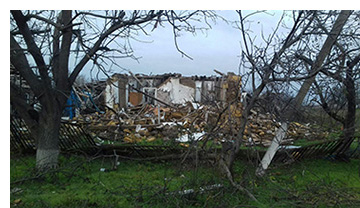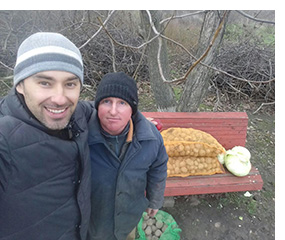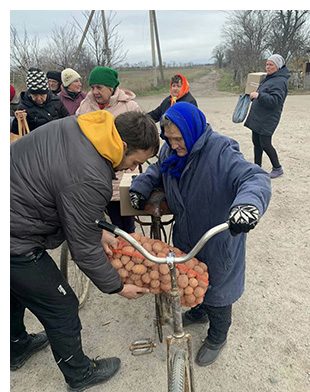By Laura McKillip Wood
In the 10 months since Russia invaded Ukraine in February, former Ukrainian missionary Laura McKillip Wood has written more than 25 articles detailing the people’s struggles to live out their faith and to survive. We asked Laura to use her connections to help describe the situation in Ukraine as 2022 ends.
LIFE IN SOUTHERN AND EASTERN UKRAINE
“Villages are the saddest part, and Ukraine is mostly villages,” says Natasha Reimer of Mulberry International. “A feeling of depression is in the air. When everything is destroyed and gray and your house is blown up.”

After 10 months of war, much of Ukraine is destroyed and gray. Reimer explains that more than 75,000 residential buildings have been destroyed, 40 percent of the electric grid is critically damaged, and lots of villages and small towns have been wiped out. More than 6,500 people have been killed, over 6 million people displaced within Ukraine, and over 8 million Ukrainian refugees have fled the country.
Mulberry International has been working with those affected by Russia aggression toward Ukraine since Russia’s annexation of Crimea in 2014; since February, Mulberry has increased their efforts in assisting. Recently, one humanitarian aid worker, Nikolai*, collected 20 tons of potatoes from people in western Ukraine. With help from Mulberry, he rented a semi-truck and drove them to villages in the Kherson region of southeastern Ukraine.

Kherson, the capital of the region, was occupied by Russian troops for months and recently regained its freedom. Humanitarian aid trucks are allowed to return there. People flock to the churches, hopeful for aid but also longing for the encouragement of the gospel and connection with others.
On his next trip to the region, Nikolai planned to bring firewood from western Ukraine. Since the country’s infrastructure has been bombed extensively, regions in southern and eastern Ukraine have not had reliable power for months; this problem also impairs gas and water distribution. When people go to the forest to harvest firewood, they encounter landmines. White crosses line the paths, markers of where people have been killed by mines.
“Our church [in Kherson] has an artesian well, so it has been providing people with drinking water,” says Yulia Lubenets, who was born and raised in Kherson and works with TCM; she is living in Austria because of the war. “There have been huge lines of people.”
The church also has generators and provides hot tea, warm meals, and the chance to charge cell phones. Some people stay in the church building, either because they are homeless due to bombings or because they are afraid to go home.
The church’s pastor, his wife, and his children have stayed to serve the community, despite the danger. Many Christians stayed specifically to be a light in dark times.
Lubenets says her friends back in Kherson tell stories of “incessant shelling which kills and leaves people without their houses and apartments or at least without windows, which makes living conditions unbearable.” The church assists by helping winterize apartments that have been shelled. Organizations like Tavriski Christian Institute, originally located in Kherson but now relocated to western Ukraine, send trucks of aid back to the Kherson region.
LIFE IN WESTERN UKRAINE
“Gone is the fear of the future, but not the horror of what is happening,” says Ksousha, describing conditions in western Ukraine. There, electricity is turned off every day according to a schedule.

“Sometimes I walk down a street with many small stores, and there is a terrible hum because of all the generators,” Ksousha explains. The heat, hot water, and appliances in many homes are electric, so some people purchase camp stoves with gas tanks to cook. Children in schools endure the outages, hiding in bomb shelters during air raids. Sometimes they spend weeks doing online school from home. Parents worry their children’s education is lagging.
Inflation has caused store prices to spike 30 percent or more, and the average person struggles to pay for food, especially since 35 percent of the people have lost their jobs. Some public places offer charging stations and internet access.
People are still trying to accept the injustices and losses they have experienced. Ksousha says she had begun to adjust when suddenly her husband was drafted into the military. She worries about him all the time.
“There are lots of terrible stories about the guys on the front line,” she says. “My husband tells awful stories.”
Kyiv used to be a bright, vibrant metropolitan area. Now nights are dark and quiet.
“Those who can afford it move into village houses with wood heaters and ovens and wells in the yard,” says Anya, a resident of a village outside Kyiv. “Most Ukrainians have it really tough, especially the elderly, lonely, disabled people, and families with babies.”
People watch YouTube videos and learn creative ways to heat their homes with everyday items.
“We all understand it is only the beginning of the hardships. January and February will be a challenge,” she says.
John Murphy, whose Odessa Mission ministry now works with Mercy Partners in a collaborative effort called Love for Ukrainians, says losing power changes people’s lives in unexpected ways.
“Our former neighbor in Odessa has to help her 4-year-old daughter up many flights of stairs to reach their 14th-story apartment whenever they decide to exit their building,” Murphy says. “If they go to buy food, that means carrying heavy grocery bags, too.”
Schools without underground bomb shelters have closed, he says, leaving parents with homeschooling responsibilities.
Despite the hardships, “Ukrainians help each other a lot,” Anya says. People in her village collect warm clothing, blankets, gas heaters, candles, and food to send to those in southern and eastern areas, where conditions are much worse. She thinks people volunteer to help others to deal with the anxiety they all experience.
“Humanitarian activity gives their lives some purpose, which is vital for not losing hope,” says Anya, who says the ways people talk about God and faith have changed since the start of the war.
“They seem more thankful now, more tolerant and patient with one another.” Ukrainian Christians in cities and villages have led the way in humanitarian aid and caring for others in these difficult times in western and eastern Ukraine.
*Nikolai’s name has been changed since he is working in sensitive areas.
For more information about the organizations mentioned or to donate:
TCM—Type “Yulia” in the note section to donate to her work.
Laura McKillip Wood, former missionary to Ukraine, lives in Papillion, Nebraska, and writes about missions for Christian Standard.


Thank you for the update